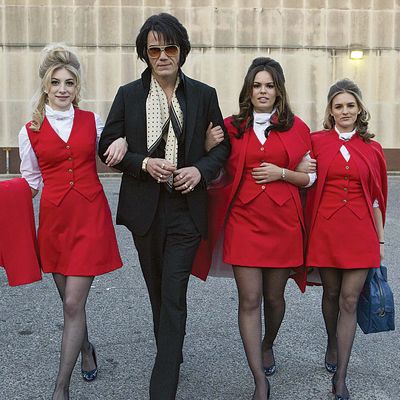
In these days when President Obama routinely hosts rappers at the White House, it will be hard for younger folks to understand the weirdness of the title pairing of Elvis & Nixon, a thoroughly charming comedy that bobs on a sea of incongruities. You have to realize that — as the expanding body of lip-smacking-good Oval Office tapes makes clear — Richard Nixon was likely the most ill-at-ease chief executive we’ve ever had and that his alienation from the popular culture of his day was absolute. Although John Lennon made a pest of himself, Nixon didn’t put any rock stars on his “enemies list” because they weren’t a part of his consciousness. He loathed them generally, from a distance, for their sexual magnetism, authority flouting, drug taking, and presumed alliance with antiwar protesters and other godless communists. When, in the winter of 1970, Presley delivered a letter to the White House asking to meet with Nixon and be appointed a “federal agent at large” in the war on drugs, it must have seemed like a Candid Camera prank. It’s only in this movie that the encounter makes psychological — and poetic — sense.
Michael Shannon plays Elvis at the start of his absurd last stage, before the weight gain but after his own alienation from the modern world had taken hold. Shannon doesn’t deliver an Elvis impersonation and doesn’t, in truth, conjure the man who by 1970 had sullied his persona with Viva Las Vegas, Clambake, and 29 other wretched films the Colonel shoved him into. But the Elvis he gives us is, on its own terms, revelatory. Shannon is too fine an actor to “play” crazy. What he plays, instead, is a kind of casual, soft-spoken kingliness. This well-mannered southern boy — who abused only “legal” drugs — can’t abide the chaos and disrespect he sees on one of his many Graceland TV screens. His idée fixe is that he can speak to the young and disillusioned as no one else can. Emboldened by memories of his Army stint, various honorary badges he has been awarded by local sheriffs, and a culture of guns, spy movies, and karate, he sees himself as Nixon’s natural ally. And Nixon’s men Egil “Bud” Krogh (Colin Hanks) and Dwight Chapin (Evan Peters) see an unexpected opportunity to show the youth of the world that their boss is a cool guy. A surreptitious parking-garage meeting between the president’s men and Elvis’s handlers (played by Alex Pettyfer and Johnny Knoxville) is a nuthouse inversion of All the President’s Men.
Working from a script by Joey Sagal, Hanala Sagal, and (oddly enough) Cary Elwes, director Liza Johnson has the perfect sprightly touch. (The film is a trim 87 minutes.) Watch characters’ faces freeze in amazement and incomprehension as Elvis matter-of-factly strolls up to the White House gate and into various federal offices: He should be laughed off, but … he’s the King. He has a delicious scene with Tracy Letts (in whose plays Shannon made his mark) as a federal deputy whose response to Presley’s contention that movie acting has made him a master of disguise is “I … I … I … I …” (Only African-Americans — in a sop to modern audiences — are shown regarding him with skepticism for the plundering of their culture.) Elvis arrives at the White House with multiple concealed guns, and proceeds — pointedly — to ignore every last bit of protocol. He even stops Nixon in his tracks.
In the opening crawl, Elvis & Nixon alerts us to the fact that no transcript exists of the title encounter, but if it didn’t happen the way it does here, it should have. Start with a president played by Kevin Spacey — who’s stupendous, the best and subtlest Nixon ever. With seeming effortlessness, Spacey captures the stiffness born of terrible insecurity that makes all that protocol necessary. Unused to someone who doesn’t bow and scrape, his Nixon is further disarmed by Presley’s stream (part real, part cunning) of anti-hippie invective. That really was how subordinates won Nixon’s confidence — by attacking his enemies even before he could.
Perhaps out of fear the audience won’t be able to “relate” to anyone, Elvis & Nixon makes Pettyfer’s Jerry Schilling an ingénue, forced to choose between his lifelong friend and his fiancée back in Los Angeles. It’s not a suspenseful plotline, but it’s not painful, and it does prompt a few good speeches in which Elvis laments the way his image has overwhelmed his true self. Those speeches make its makers’ intentions clear. They’re satirists who have sympathy for the objects of their satire. They show how the fortress of celebrity brings out the absurd in its prisoners.
*This article appears in the April 18, 2016 issue of New York Magazine.


